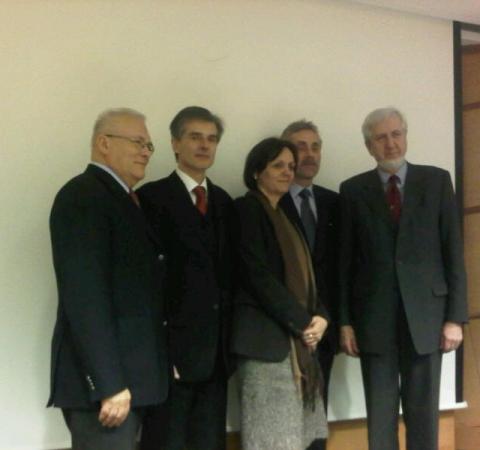Event Report - “Visegrad Group 1991 – 2011” (20 years of cooperation)

On 15 February 2011, twenty years after the establishment of the Visegrad cooperation, a conference has been organised by the Center for EU Enlargement Studies (CENS) to commemorate this event and discuss the future of the Visegrad Group.
Péter Balázs, Director of CENS, welcomed the speakers of the conference, namely Géza Jeszenszky, former Minister of Foreign Affairs of Hungary who was present at the moment when the foundations of the V4 cooperation have been laid down in Visegrad in 1991, Kálmán Mizsei, EU Special Representative of Moldova, actively involved in the beginnings of this cooperation, and the ambassadors of Poland, Slovakia and the Czech Republic to Hungary, Roman Kowalski, Peter Weiss and Helena Bambasová.
Géza Jeszenszky held the opening speech and shared with the audience his memories from the period when the Visegrad cooperation has started. Despite that the V4 had been reported to come to a quick end, the prospects of cooperation were very promising. The original goal of the countries was to transform their societies and coordinate their foreign policies. Visegrad had no formal institutions but personal dedication to the fulfillment of these aims kept the countries together. Visegrad deserves recognition because it eliminated tension and conflicts and helped creating a balance between two political orientations (eastern and western). Already after the first Visegrad Summit in Budapest it was clear that separately, Central Europe is weak, but united it is irresistible. After their original aim was accomplished and the Visegrad countries joined the EU, they declared that they will continue with their cooperation even as EU members. This cooperation should be felt by every citizen and roads, railways, pipelines should be built at the local level, cross-border cooperation should be intensified. Visegrad countries share a common history, culture, aims, interests and combined they stand for a major power. If they speak in union, they will be better heard. The Visegrad cooperation should set a good example for other regions struggling with the past.
Kálmán Mizsei emphasised that we are celebrating a successful cooperation in a region where the cooperation is actually not easy. In the beginnings, Visegrad countries were rather competing with each other but then they started to feel the taste of cooperation and wanted to show the EU that they are mature for the integration. He named the overcoming of socialism an enormous success and expressed the need for the development of a north-south infrastructure.
Peter Weiss took the floor as the ambassador of the country which is currently presiding the V4. He said that Visegrad created a new hope: the countries realized that they share a common history, goals and aspirations. It has not been set as an alternative to the European integration. During the past two decades, it became an established forum for cooperation and a strong political brand. As the key priorities of the Slovak V4 Presidency he named strengthening regional cooperation in energy issues, economic and social inclusion, integration of the Western Balkans and European Neighborhood Policy. Its aim is to inject further dynamism into the cooperation, deepen it and push shared interests within the EU, not against the EU. The Central European countries are not yet the agenda setters in Brussels but this year, the Hungarian and Polish EU Presidencies provide an opportunity to push the V4 agenda in the EU. Therefore, the four countries should coordinate their positions on such issues as the cohesion policy, economic governance, representation in the European External Action Service and consular and diplomatic cooperation. There are still tasks lying ahead in improving cross-border cooperation, reducing the impact of the global crisis, energy security and building comprehensive infrastructure. The mission of V4 has not come to an end but gained a new dimension in sharing common responsibility for the whole region.
Helena Bambasová pointed out that the beginnings were characterized by rivalry between the countries. The turning point was the NATO accession when they realized that they face a new reality and that they are stronger when acting together. Cooperation improved significantly after joining the EU and different instruments for cooperation at different levels have been established. She named the International Visegrad Fund as an important vehicle.
Roman Kowalski said that the Visegrad Group is a great economic power, strategic location and a significant emerging market. It is a great example of cooperation and V4 plus is also a successful concept. Even though the cooperation was characterized by competition between countries in the past, today it is about common understanding that success can only be achieved when acting together.
Péter Balázs said that the past two decades of cooperation proved that the V4 is a successful structure. Politics contested the usefulness of Visegrad. Some people said it is a substitute for the EU and they were doubtful because it was an alliance without a dominating power, functioning on a voluntary basis. There were bilateral difficulties but the Visegrad framework softened them since it provided a meeting place for politicians. The Visegrad countries are natural allies and close partners but all of the countries have other allies and close partners. What keeps this cooperation together is internal cohesion. He emphasized that the Visegrad Group matters – its population equals to the population of a big EU member state. Visegrad cooperation is stable – it has not been enlarged, remained the same and has close friends. As for the future, it lies in the V4 plus formula. More institutions would be useful, the Group should be more courageous, take more common positions and support each other. It is also important to find common denominators and harmonize relations with big neighbors such as Russia and Germany.
